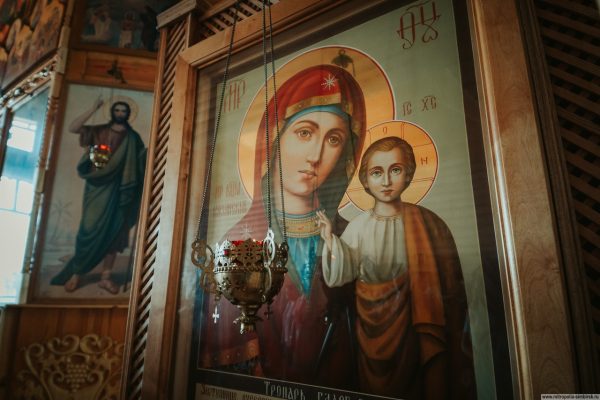In the name of the Father and of the Son and of the Holy Spirit. Amen.
Well, it is still September, so I am sticking to my theme of this being the liturgical new year, the month that we reset our goals, spiritually, for ourselves, for our family, and it’s very important that this concept of this being the new time be a real part of our lives. I think it is important enough that we should have an apple tree in our yard, that we see the fruit come to ripeness and needing to be picked, that we have some sort of idea of the harvest being done, whether it is activities of summer or kids going back to school, that we get this idea that now is the time. Now is the time to set our hearts and our minds towards new goals, regaining whatever we have to regain in order to reset our hearts and our hope.
We talk often, in confession, many times about having to regain the hope of spiritual growth. After we’ve been in the church for a while, after we have struggled for a time, after we have failed enough, there can creep in really a despair that hangs around for a long time, that just is always whispering in our ear that, “We’re going to hang on. We’ve gotten to the end of our rope. We’ve tied a knot. We are hanging on.” We’re not going to give up, but that our hope for change dwindles over time. Many of us know the experience, the older half of the church and many of the new people who have come over the years of that zeal, with which we come into the church and we’re reading the lives of the saints and we’re studying the theology and the history of the church or learning about the liturgical life. And we’re so fired up and we’re just ready to be holy, right, ready to be holy. But it doesn’t work that way.
That initial zeal is very important. It’s actually a gift from God because when we come into the church, we’re baptized, we have an intense spiritual experience. That’s a gift from God that we would know what we can be like on the inside. We know the love for God that we’re capable of. We know the zeal that we’re capable of having. And after a time, though, God allows that gift to wane so that we would find our personal zeal to go after reclaiming it again. And we can’t get stuck.
Like a marriage, after we’ve been married for five years or ten years or something, and we get to know each other really well, there’s nothing really new to explore or to discover about the person. We can either go into this mediocre relationship of really co-working and having a general agreement about how things are going for the rest of our lives with our spouse or we can say, “Okay, I know everything now. There isn’t anything left unknown about you. I know all about you, the good and the bad. Now we can make a great plan for a golden relationship in the future, where we each are admitting our weaknesses and we each are cooperating with our strengths. We can go now because there’s no misunderstanding anymore. We know who we are and this can become a golden blessed, perfected relationship.”
And in our relationship with God we have to, to a certain degree, have the same experience, where it’s very exciting to get to know Christ and the church and the saints. It’s very exciting. All of these things, we’ve never known before when we dive into the richness of orthodoxy. But then, after a while, given enough time, we know at all. We have a general familiarity with miracles and with the great feasts of the year, with a theology that’s beyond behind it, and if we’re staying in a place in our life where newness and excitement is what keeps us motivated, we’re in big trouble. We’re in big trouble.
That’s where impulse shopping comes from, right? Maybe if I buy this new thing I don’t have yet, that little, tiny moment of happiness this time, after a thousand times of it being followed up by, what do they call it, buyer’s remorse, maybe this time the happiness will last. But that’s not the way it works and we know this from so many other experiences in our life. If we’re going to be serious about our job, it’s very exciting to get a new job going into new area of profession, get really good at it. Everybody is saying what a wonderful employee we are and then we hit that time where we’ve been there long enough where it’s not exciting anymore, but it’s time to perfect what we do to move past the excitement and to start perfecting the experience.
And so here we are in the new year. We have been given the Feast of the Nativity of the Theotokos. Yesterday, we talked about how this glorious birth of this woman who is just like us, and yet she is going to be profoundly different from us in that she is going to voluntarily do the will of God in every way, all of her life. This is the person that God has been waiting for since the prophet said that a virgin would conceive and give birth. That had to be a woman.
As I said yesterday, John the Baptist also keeps the law, fulfills the law, is obedient to God perfectly, but he can’t be the virgin that gives birth. There has to be a woman along with this man as well. And in her life, we see this thing that we have to give in to where we actually, not only decide that we are Christians, not only decide once that we are going to follow Christ, but it has to be the way that we live, where we just get up in the morning every single morning, morning after morning, and do our best to do His will.
The most important thing that we do when we get up in the morning as we ask ourselves, “What does God want me to do?” Because when the ego is engaged, when we wake up in the morning, we think, “What do I want to do?” Or we think, “Shoot, what do I have to do?” We go to work grumbling. We don’t really want to be there or we get a day off and then we’re confused when we have some time off because we have so many things we want to do. I know what that’s like personally.
And, yet, the question we need to be asking all of the time, every day, as difficult or impossible as that seems or even as boring as that might be, we have to ask ourselves, “What does God want me to be doing?” Mary asked herself every day, “What am I supposed to do?” not, “What do I want to do?” And that is what makes her able to be the Theotokos. She was Mary, the Christian, Mary, the follower of God, the keeper of his commandments before she was the Theotokos. And she had to be that to Mary before she could be the Theotokos. Today we celebrate her parents, Joachim and Anna and we look at Joachim and Anna. They have this incredible honor of being the parents of the Theotokos. It’s their daughter that becomes the mother of God.
We know clearly from the theology of the church and from the lives of the saints talking about Mary, that her parents played an incredible role in her life as all of our parents do and did. She is a good woman from good people. People who also, despite all the odds, ask themselves over and over again, “What does God want me to do today?” And particularly, with the idea of wanting to have children and not being able to have them, they persevered.
The tradition of the church says that they were married for 50 years before the Theotokos was born. Those days, you could get married very young. They may have been married by the time they were maybe 14, 15 years old and so they were probably in their mid-60s, at least, when the Theotokos was born, and through all of those 50 years of marriage, with a pressure to have children that we do not even understand anymore. They lived in a culture where not being able to have kids was an overt sign for you of not favored by God if you couldn’t have kids. We don’t believe that, of course.
But that was their belief at the time. Your immortality was not found in heaven with God. Your immortality was found in the seed that you produced. You lived on in your children and their children and the generations that came after you. If your lineage ended, your immortality ended. Incredible pressure. We know, because you can’t not do this and have the will of God done in your life. For 50 years of marriage, they got up every morning. They accepted that God was not giving them children. They asked themselves, “What does God want me to do today?” The answer was, “Even though you desire kids and you’re not having kids, you’re going to go about your life in a godly manner anyways. You’re not going to be bitter. You’re not going to wonder what God is doing. Maybe He made a mistake with you personally.” They had the faith that something greater was in store. They didn’t know what it was, but something greater was in store. They were called to something different from everybody else, even though they suffered humiliation in the culture that they were in because of not having children.
And the analogy that is there for us, and especially now in the beginning of the liturgical year, is that we have to give into the idea that we are only going to make ground through incredible perseverance. We have to be much, much, much more tough than the world suggests that we ought to have to be. We have to be tough. We have to look at our lives and realize that the context of our own life and God’s providence, the very life that we are in right now, work problems, health problems, problems with the family, unemployment, over employment, over busy-ness, whatever it is, the challenge that comes to me today in this very moment, it is providentially, what God is giving me. And if I accept it and I work on it with a Christian attitude of faith in Christ, it becomes the absolute means for my transfiguration, personally.
If I try and escape the struggle that I am in, I am getting away from the very exercise that is going to save me. You hear me say often that we need to stop desiring change and we have to start desiring what is actually happening in our life. Did you have an argument with your children or with your spouse or with your co-worker, your boss? The opportunity to go back and repair that in a Christian manner is the exact exercise God wants you to be doing right now.
Did you have a hard time getting up this morning and coming to church? That’s okay. You did it. You did it. It was a challenge that you faced this morning in faith, out of obedience, maybe even out of just routine or maybe out of a little bit of social pressure. “I don’t want to not be at church. Somebody will notice.” That’s not the reason we want to be here. Sometimes it helps. Positive peer pressure. “What am I going to feed my kids for lunch today? What am I going to do with the rest of the day off? Is liturgy going to end soon enough for me to not be grumpy.”
The experience in the moment, is the experience that God is giving you, providentially, to become the person that He wants you to be. And there’s great, great comfort, great relaxation when we finally accept that instead of trying to resist it. The resistance is exhausting. To resist God’s will is futile. It’s an incredible, incredible labor that we commit ourselves so that exhausts us and we cannot win in the end and God has a sense of humor. Watch out. So when He sees us resisting His will, resisting His will, resisting His will, he chuckles and he just turns up the volume a little bit more, right?
And the lesson we were going to learn from getting a flat tire, now we’re going to have to learn from getting in a car accident. And it’s not Him being mean to us. We are the spoiled little children that need a spanking, right? That’s just who we are. We learn voluntarily in faith, in obedience. I like to say to people, “Learn the hard way. Learn the easy way, but learn, right?” It doesn’t matter how you learn, learn. Make a change in your life. God’s providence occurs in our life out of our voluntary obedience and seeking out His will and His providence or we learn it through the suffering that our own choices brings into our life and He allows it to happen. He allows it to happen.
A providential exercise of patience, right, and good parenting. God bless you. So this isn’t bad news. It might sound like it. I talk tough sometimes, but I don’t mean to discourage anyone. The joy is your salvation is right in front of you. You don’t even have to go find it. Joachim and Anna didn’t have to go find what to do in order to make them holy in the sight of God. They just did what God allowed in their life. Mary, before being the Theotokos, did not have to go find her path towards God. It was given to her. Her parents put her in the temple at three years old, and she submitted to that. She submitted to it.
And so in the beginning of this year, when we’re ready to commit, we have this wonderful example of the Theotokos birth and Joachim and Anna today. At the end of this week, on Sunday, we’re celebrating the Exaltation of the Cross, the Feast of Helen going and finding the actual cross that Christ was crucified on, that now we have the blessing of having a relic, once again, in our midst. And the church was not unwise in recognizing, in the celebration of these feasts, because the Exaltation of the Cross is a historic event, but it happens in September. And by God’s providence, here we are contemplating Mary and her parents giving their life to God, and immediately we have the opportunity to be reminded to pick up our cross, having denied ourselves and follow Christ.
If we don’t like that cross, it weighs a billion pounds. If we love it, it’s wonderful having it on our shoulders. And so we go after that now. We have an opportunity to reset. So look at yourselves in God’s providence at this time. Accept the struggles that are on your shoulders right now. If they are struggles that we created, un-create them. If you’re overly busy, simplify. If you’re at the wrong job, change jobs. If you have the spouse that you have, improve the relationship. Don’t change spouses. It’s too late. If you’re married, it’s too late to become a monastic.
Embrace these struggles with joy. Enter into them. When we stop resisting them and we start working on them, it becomes a wonderful hobby, a wonderful project, a wonderful work that brings us closer to God and the people that are around us. A couple of weeks ago, we had the wonderful analogy given to us by Father John Takahashi, of the chess game. And in life, we have to be very serious, I mentioned this before, that recognizing, “Are we in the beginning game or the middle game or the end game, depending on our age and our relationship with God and the church?” But as Orthodox Christians, in the liturgical year, we’re in the beginning game again. Now is the easy time. Now is the time when it’s mainly small movements that are going to set up the experience of the rest of the year.
So rejoice in the fact that the game is starting over again, right? In life, it doesn’t start over again. Once we’re in the mid game or the end game, we’re just there and the end is going to happen. But in the Christian year, and in our dedication to pursuing Christ, going after him, wanting to be the new creation that Saint Paul called us today in the Epistle, embracing the idea as we heard in the Gospel that God did not send His Son into the world to condemn the world, but the world through him would be saved. Set up the game of the year so that when it’s summer again, you look back and you see that you did reap a new harvest, and hopefully one that was even bigger and better than the year before.
In the name of the Father and of the Son and of the Holy Spirit. Amen.

















